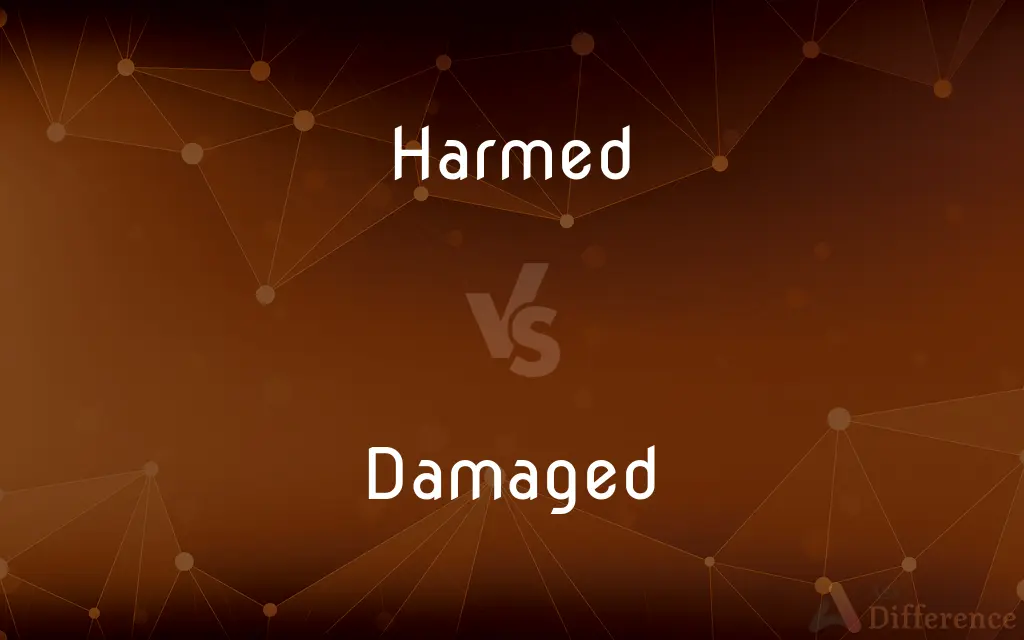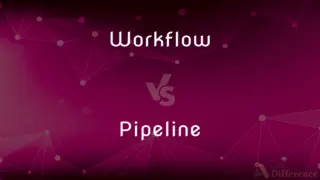Harmed vs. Damaged — What's the Difference?
By Maham Liaqat & Urooj Arif — Updated on March 29, 2024
"Harmed" is infliction of injury or damage, affecting well-being, used for both physical and psychological effects on living beings. "Damaged" implies physical deterioration to objects, materials, or structure, emphasizing impairment of function or value.

Difference Between Harmed and Damaged
Table of Contents
ADVERTISEMENT
Key Differences
"Harmed" typically conveys the infliction of pain, injury, or negative effects on living beings, encompassing both physical and psychological aspects. It implies an adverse impact on health, safety, or comfort. On the other hand, "damaged" is primarily used to describe physical harm or degradation to inanimate objects, structures, or materials, highlighting a reduction in functionality, quality, or value.
When discussing living creatures, "harmed" is the more appropriate term, as it captures the broader implications of suffering or injury, including emotional distress or psychological impact. Conversely, "damaged" is suited to contexts involving non-living entities, where the concern is about the integrity, condition, or usability of the item or structure affected.
The notion of being "harmed" can extend to scenarios involving reputational damage or financial loss for individuals or entities, where the injury is not physical but still significantly impacts well-being or status. "Damaged," however, remains closely tied to the physical state of objects, often necessitating repair, restoration, or replacement to restore original function or appearance.
Legal and ethical discussions may use "harmed" to address issues of liability, compensation, and moral responsibility related to the welfare of people or animals. In contrast, "damaged" frequently appears in insurance, manufacturing, and consumer goods contexts, where the focus is on assessing, repairing, or compensating for the physical degradation of property.
The distinction between "harmed" and "damaged" also reflects in the response required; harm to living beings may necessitate medical treatment, psychological support, or protective measures, while addressing damage to objects typically involves technical repair, financial reimbursement, or physical replacement.
ADVERTISEMENT
Comparison Chart
Applies to
Living beings (people, animals).
Inanimate objects, materials, structures.
Implications
Physical, psychological, or emotional injury.
Physical harm, deterioration, loss of functionality.
Contexts
Health, safety, personal well-being.
Property integrity, functionality, value.
Response Required
Medical treatment, psychological support.
Repair, restoration, financial compensation.
Legal and Ethical Considerations
Liability, compensation for personal injury.
Insurance claims, property repair costs.
Compare with Definitions
Harmed
Suffering from injury or adverse effects.
The victim was harmed during the robbery.
Damaged
Physical harm reducing functionality or value.
The storm damaged the roof of the house.
Harmed
Can apply to reputational damage.
His career was harmed by the false accusations.
Damaged
Concerned with material objects or structures.
The vase was damaged during shipping.
Harmed
Can include psychological impact.
Bullying has harmed his mental health.
Damaged
Requires repair, restoration, or replacement.
The damaged equipment was sent for repair.
Harmed
Often requires medical or psychological intervention.
She was harmed and needed immediate medical attention.
Damaged
Often involves assessment of physical condition.
Experts assessed the painting for damage.
Harmed
Legal implications involve personal injury.
The company was sued for products that harmed consumers.
Damaged
Can lead to financial loss or compensation claims.
The damaged goods resulted in a large insurance claim.
Harmed
Physical or psychological damage or injury
The storm did great harm to the crops.
Damaged
Destruction or a loss in value, usefulness, or ability resulting from an action or event.
Harmed
Immoral or unjust effects
They made a mistake and meant no harm.
Damaged
Damages(Law) Money required to be paid as compensation for an injury or wrong.
Harmed
To do harm to
Pollutants that harm the environment.
People who were harmed in the accident.
Damaged
(Informal) Cost; price
What's the damage for the tickets to the show?.
Harmed
Simple past tense and past participle of harm
Damaged
To cause damage to.
Harmed
Having had pain or loss or suffering inflicted
Damaged
To suffer or be susceptible to damage.
Damaged
Simple past tense and past participle of damage
Damaged
Suffered a damage.
Damaged
Changed so as to reduce value, function, or other desirable trait; - usually not used of persons. Opposite of undamaged.
Damaged
Rendered imperfect by impairing the integrity of some part, or by breaking. Opposite of unbroken.
Damaged
Being unjustly brought into disrepute; as, her damaged reputation.
Damaged
Made to appear imperfect; - especially of reputation; as, the senator's seriously damaged reputation.
Damaged
Harmed or injured or spoiled;
I wont't buy damaged goods
The storm left a wake of badly damaged buildings
Damaged
Being unjustly brought into disrepute;
A discredited politician
Her damaged reputation
Damaged
Especially of reputation;
The senator's seriously damaged reputation
A flyblown reputation
A tarnished reputation
Inherited a spotted name
Common Curiosities
How is damaged property addressed?
Through repair, restoration, or financial compensation to restore its functionality or value.
Can a business be harmed or damaged?
A business can be "harmed" in terms of financial loss or reputation. Physical assets of a business can be "damaged."
Is emotional distress considered harm or damage?
Emotional distress is considered a form of harm, affecting an individual's psychological well-being.
Can an object be harmed?
Typically, "harmed" is used for living beings, not objects. Objects are described as "damaged."
What are common causes of harm to individuals?
Accidents, violence, negligence, and psychological trauma are common causes.
What does it mean to be harmed?
To suffer injury, damage, or negative effects, especially relating to physical or psychological well-being.
How do companies assess damage to their products?
Through inspections and evaluations to determine the extent of physical harm and the necessary repairs or replacements.
What kind of response does harm require?
Harm to individuals often necessitates medical treatment or psychological support, depending on the nature of the harm.
How do insurance companies differentiate between harmed and damaged?
Insurance policies typically address "damaged" property for repair or compensation, while personal injury claims concern individuals who have been "harmed."
What legal recourse is available for someone who has been harmed?
Legal recourse can include personal injury lawsuits seeking compensation for medical expenses, suffering, and lost wages.
Can the environment be harmed or damaged?
The environment is typically described as being "harmed" due to the living ecosystems affected, though "damaged" can also be used in the context of physical alteration or degradation.
Can digital data be harmed or damaged?
Digital data is typically described as "damaged" when corrupted, though "harmed" can apply to individuals or businesses affected by data breaches or loss.
What preventive measures can be taken to avoid harm or damage?
Preventive measures include safety protocols, maintenance, secure storage, and emotional support systems.
How does society address environmental harm?
Through conservation efforts, regulations to prevent pollution, and initiatives to restore damaged ecosystems.
Why is it important to distinguish between harmed and damaged?
The distinction clarifies the nature of the injury or loss and determines the appropriate response or remedy.
Share Your Discovery

Previous Comparison
Scramble vs. Climb
Next Comparison
Workflow vs. PipelineAuthor Spotlight
Written by
Maham LiaqatCo-written by
Urooj ArifUrooj is a skilled content writer at Ask Difference, known for her exceptional ability to simplify complex topics into engaging and informative content. With a passion for research and a flair for clear, concise writing, she consistently delivers articles that resonate with our diverse audience.
















































